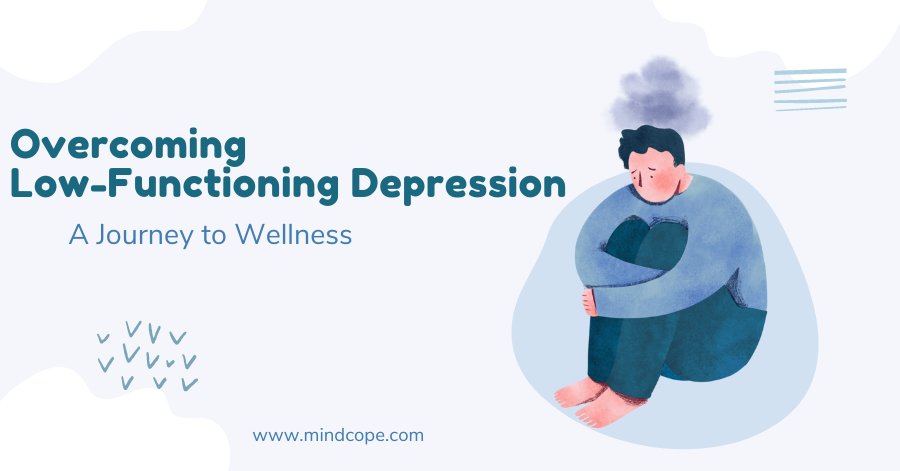In the depths of low-functioning depression, even the simplest tasks can feel like climbing mountains, and the world around you loses its sparkle. It’s a battle that millions face each day, silently struggling to find hope amidst the overwhelming darkness. But fear not, for amidst the shadows; there is a flicker of light – a guiding star ???? that leads us on a transformative journey to reclaim our lives.
This article explores the path to overcoming low-functioning depression, its potential causes, risk factors, diagnosis, treatment, and strategies for overcoming low-functioning depression. Together, we will unlock the power within and uncover the secrets to finding wellness and embracing life once again.
Table of Contents
Understanding Low-Functioning Depression

“Low-functioning” depression means you have depression that makes it hard to do everyday tasks. You get tired easily. The behavior associated with this type of depression makes diagnosing it very easy. Different people understand the term “low-functioning” in different ways.
Symptoms and Common Indicators
There are numerous signs and symptoms of this condition, which may include:
- Persistent Feelings of Sadness and Hopelessness: ???? People with low-functioning depression always feel sad, and it’s like a dark cloud following them everywhere. This can make it hard to imagine a brighter future and leave you feeling hopeless.
- Lack of Energy and Motivation: ⚡Low-functioning depression drains your energy like a leaky faucet, leaving you feeling tired and lacking the drive to do anything. Even simple tasks become tough.
- Difficulty with Concentration and Decision-Making:???? It’s like having a foggy brain with low-functioning depression, making it difficult to focus and judge. This can impact your personal and professional lives and may cause you to question your abilities or feel you need to improve.
- Changes in Appetite and Sleep Patterns: ????️ Depression that affects your daily life can make you lose or gain weight by affecting your appetite. It can affect your sleep by making it hard to fall asleep or causing you to sleep too much.
Exploring the Potential Causes and Risk Factors
Different risk factors can contribute to low-functioning depression. Following are some of the main factors that may contribute to the development of this condition:
- Biological Factors and Genetics:???? Research indicates that biological factors and genetics contribute to low-functioning depression. Chemical imbalances in the brain, such as depleted serotonin levels, can contribute to the development and persistence of depressive symptoms.
- Environmental and Situational Triggers: ????️ Things like persistent worry, trauma, or specific life events can either cause or exacerbate low-functioning depression. These triggers can be relationship problems, stress over money, or setbacks in a person’s job.
- Co-occurring Disorders and Comorbidity: ???? Depression that is low functioning can often be found together with other mental health problems like anxiety disorders or substance abuse. The presence of multiple conditions can complicate the diagnosis and treatment process, underscoring the significance of a comprehensive approach.
Watch this: INTROVERSION OR DEPRESSION? THE 5 DIFFERENCES (MUST WATCH!)
Seeking Help: Diagnosis and Treatment
According to Statista, the number of people experiencing symptoms of depression in Italy between 2020 and 2021 was highest among people aged 50 to 69, at 7.3 percent. Therefore, it’s important to learn about the signs of low-functioning depression so you can get help quickly. Common symptoms and signs of depression can include:
- Persistent feelings of sadness
- A lack of energy
- Trouble focusing
- Alterations in eating and sleeping habits
You should immediately contact a mental health professional if you have been experiencing these symptoms for a long time. They can evaluate you thoroughly and create a treatment plan that suits your needs.
Diagnostic Criteria and Assessment Tools for Low-Functioning Depression
You must undergo a thorough evaluation by a licensed mental health professional to diagnose low-functioning depression. The doctors will look at the person’s symptoms, how long they have been experiencing them, and how much they affect their ability to function. Although the criteria for low-functioning depression may vary slightly between diagnostic manuals like the DSM-5, some common indicators can help.
- Consistently Feeling Down: When someone suffers from low-functioning depression, they feel sad for a long time, lose hope, and don’t enjoy things they used to.
- Struggling in Daily Life: Low-functioning depression can make it hard for a person to do things like work, socialize, and take care of themselves. Everything seems harder.
- Mental and Physical Challenges: In low-functioning depression, people often have trouble concentrating, remembering things, and making choices. Also, physical signs like changes in appetite, trouble sleeping, and tiredness may be present, making life even harder.
Mental health professionals use tools like the Hamilton Rating Scale for Depression (HAM-D) or the Beck Depression Inventory (BDI) to measure how bad low-functioning depression is and how much it affects a person’s ability to function. These tests give useful information about a person’s symptoms and can help decide what treatment to use.
Treatment Options and Approaches
Various treatment options and approaches are available for low-functioning depression, such as:
- Psychotherapy and Counseling: ????️ When you suffer from low-functioning depression, psychotherapy and counseling are important. Working with a trained professional, individuals can explore their thoughts, emotions, and experiences. Techniques like cognitive-behavioral therapy (CBT) help to identify negative thoughts and develop healthier coping methods.
- Medications and their Effectiveness: ???????? Medication helps to balance brain chemicals in severe, low-functioning depression. Doctors prescribe SSRIs and SNRIs. Be patient—medication works differently for everyone. Just like Rome wasn’t built in a day, progress toward finding a suitable medication can lead to incredible transformations.
- Healthy Lifestyle Changes: ????️???????? Alongside professional help, making healthy lifestyle changes can greatly aid in managing low-functioning depression. Regular exercise releases chemicals called endorphins, promoting well-being.
- Alternative Therapies and Complementary Approaches: ????????♀️???? In addition to traditional treatments, alternative therapies offer more paths to healing. Practices like mindfulness meditation, yoga, and acupuncture have shown promise in reducing depression symptoms. Remember, variety adds spice to life.
Strategies for Overcoming Low-Functioning Depression

To fight low-functioning depression, having a strong network of people who can help you is important. Share your problem with trusted family members, friends, or support groups who can listen and help you feel better.
Developing Coping Mechanisms and Self-Care Practices
- Mindfulness and Relaxation Techniques: Mindfulness and relaxation can improve your emotional health and reduce stress. Deep breathing, meditation, and yoga can calm and relax you????♀️????. These age-old approaches are well known for calming and focusing the mind. By fully accepting these techniques, you cultivate your mental condition and invite calm and serenity into your daily life.
- Setting Realistic Goals and Managing Expectations: It is important to set realistic goals and break them down into doable steps. People often say, “Don’t take on more than you can handle.” Celebrate small achievements along the way, and be gentle with yourself. Remember, progress is progress, no matter how small????????.
- Engaging in Pleasurable Activities and Hobbies: Spending time on things that make you happy is important. Explore new interests and hobbies, and make time for things that make you feel good. Always remember the famous proverb, “All work and no play makes Jack a dull boy” Find your own special “play” and do it often????????????.
Creating a Structured Routine and Maintaining a Healthy Lifestyle
Setting up a regular schedule can give you a sense of stability and purpose. Set regular times to wake up and go to bed, plan your daily jobs and activities, and prioritize self-care. “A stitch in time saves nine” is a proverb you should remember. You can manage your time and energy better if you are organized and consistent.
You must have a healthy lifestyle. Ensure you exercise regularly, eat a balanced diet, and prioritize sufficient sleep. Keep in mind that “you are what you eat,” so fuel your body with nutritious foods that support your overall well-being.
Exploring Professional Interventions and Specialized Programs
In addition to self-help strategies, seeking professional intervention is vital. A mental health expert can provide essential advice and support tailored to your needs. They may suggest cognitive behavioral therapy (CBT), group therapy, or specialized programs to treat low-functioning depression. Remember that seeking aid shows strength, not weakness. Asking for help on your healing journey is okay????????.
Can I Maintain a Professional Career While Coping with low-functioning Depression?
Maintaining a professional career while dealing with low-functioning depression is challenging but possible. Open communication with employers, seeking accommodations, and implementing self-care strategies are essential. Building a support network and accessing therapy can provide tools to manage symptoms and achieve work-life balance. With adjustments and self-compassion, individuals can navigate their careers successfully.
Conclusion

Low-functioning depression is a chronic disease that requires attention and proactive measures to heal. Individuals can seek expert help and begin their journey to well-being by distinguishing it from transitory sadness and understanding its symptoms. Low-functioning depression can be treated in many ways, such as by talking to a therapist, taking medicine, changing your lifestyle, or trying alternative therapies.
Building a support network, creating coping techniques, and sticking to a disciplined schedule all help with recovery. Along the way, real-life success stories and inspirational resources provide motivation. If you stay motivated and use the right resources, you can overcome this problem and have a better future.





